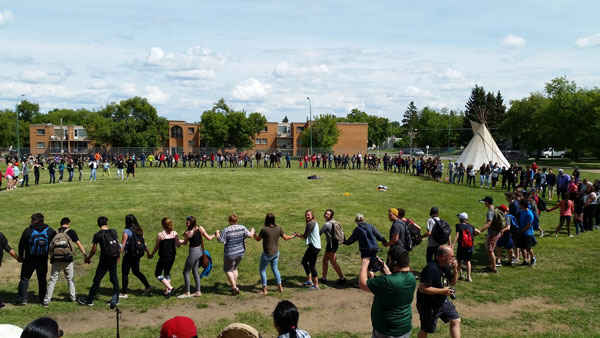Prince Albert’s two largest school divisions both received funding to advance truth and reconciliation education, but their focus will be on two separate areas.
The Government of Saskatchewan will provide roughly $140,000 in grants to advance truth and reconciliation education in the province. All programs will start next school year.
Prince Albert Catholic School Division plans to focus on the Moccasin Project, which will educate students about Indigenous culture. The Saskatchewan Rivers Public School Division already has a number of programs in place, but hasn’t decided exactly were to spend the funds.
Prince Albert Catholic School Division director of education Lorel Trumier said their division’s concept came from a teacher of Cree at Ecole St. Mary High School. She said that they were excited to receive the funding but could have found a way to use much more.
“She is on the committee with us to look at how do we honour and support Truth and Reconciliation Calls to Action in education,” Trumier said.
“We have come up with a project called the Moccasin Project where we need to learn about the beautiful culture of our Indigenous people and take some time to respond to the Calls to Action. In order to do that you have to have understanding. We will never be able to walk a mile in a person’s shoes, but we need to journey on the process of learning about it and insuring that we don’t repeat it.”
Tumier said the education aspect is just a small part of what they can do to meet the Truth and Reconciliation recommendations.
“I think every bit helps,” she said. “We are going to take full opportunities that we can on this and support our families and students in this endeavour and our staff as well so that’s exciting too.”
The Prince Albert Catholic School Division will collaborate with cultural leaders in the Indigenous community to develop a learning resource on treaty relationships and truth and reconciliation.
Provincial funds were awarded 27 provincial school divisions, one partnership school, and one qualified independent school. Each will receive up to $5,000 in funding to partner with local Indigenous communities and organizations.
Potential plans include an Indigenous healing project, Indigenous education training, Indigenous land-based learning, learning and promoting local Indigenous languages, a land acknowledgement project, Indigenous ceremony and traditional knowledge projects and Indigenous arts projects.
Saskatchewan Rivers School Division director of education Robert Bratvold said the division actively pursues implementing recommendations of the commission and the Calls to Action. These new funds will help boost those efforts, he said.
“We don’t have a specific plan yet for how we will use those funds but we have got so many options that we can do,” Bratvold said.
In a press release, the province said that the Saskatchewan Rivers School Division will collaborate with Wahpeton Dakota Nation and Muskoday First Nation to present an acquisition training opportunity for teachers to acquire the essential knowledge and skills they need to become more efficient speakers in Dakota language and Cree language.
Bratvold said the broad nature of the description allows them to take this concept in many directions.
“They know generally that this is going to be supportive of students but we know and our families know what will be most important so we can tailor those things locally that the province just isn’t able to do that as well as local school divisions can,” he explained.
Schools and school divisions were encouraged to apply for this new one-time grant when it was launched on Orange Shirt Day.
The Government of Saskatchewan said in the release that they are committed to reconciliation, as well as understanding the ongoing impact Canada’s residential school system has on Indigenous communities.
These grants provide students with an opportunity to learn about and from this tragic part of our shared history.
Michael.oleksyn@paherald.sk.ca


